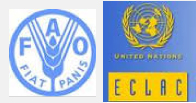Participants at the fifth Latin American and Caribbean (LAC) regional seminar on agriculture and climate change recognized the key role of family farmers and indigenous people in helping the region confront the challenges posed by climate change, protect agrobiodiversity and improve food security.
 24 August 2014: Participants at the fifth Latin American and Caribbean (LAC) regional seminar on agriculture and climate change recognized the key role of family farmers and indigenous people in helping the region confront the challenges posed by climate change, protect agrobiodiversity and improve food security.
24 August 2014: Participants at the fifth Latin American and Caribbean (LAC) regional seminar on agriculture and climate change recognized the key role of family farmers and indigenous people in helping the region confront the challenges posed by climate change, protect agrobiodiversity and improve food security.
The seminar, organized around the theme ‘Agrobiodiversity, Family Farming and Climate Change,’ was held on 20-21 August 2014, in Santiago, Chile, and attended by officials from Agriculture and Planning Ministries, national agriculture innovation agencies and international experts.
The seminar aimed at: examining conceptual approaches and experiences in assessing the role of agrobiodiversity in adapting agriculture to climate change; sharing experiences in, and promoting policy dialogue on, the diversification and adaptation of family farming to climate change; and strengthening regional cooperation on protecting and promoting the roles of family farming and agrobiodiversity in climate change adaptation. Presentations included a briefing by an expert from the Intergovernmental Panel on Climate Change (IPCC) on relevant findings of the Fifth Assessment Report (AR5). Discussions focused on, inter alia, traditional crops such as maize and potato and phyto-genetic resources, and the integration of traditional knowledge with scientific knowledge in evaluating and adapting to climate change.
In her opening remarks, UN Economic Commission for Latin America and the Caribbean (ECLAC) Executive Secretary Alicia Barcena emphasized the need for LAC to: develop more diversified and resilient agricultural systems; and to ponder the role of family farming, indigenous peoples and traditional knowledge in adapting the region’s agriculture to variable climate conditions, protecting agrobiodiversity and promoting food security. Raúl Benítez, FAO Regional Representative for LAC, noted that 80% of LAC farmers are family farmers and 50% of LAC rural employment is on family farms. He called for providing resources and other assistance to family farmers to modify their practices to better promote biodiversity conservation and climate change adaptation. He further emphasized the importance of addressing poverty and hunger among family farmers and indigenous people.
The seminar was the fifth in an annual series launched in 2010 by ECLAC and FAO’s Regional Office for Latin America and the Caribbean (FAO/RLC). The fifth iteration was supported by the French Cooperation and sponsored by Oxfam UK and the Organization of American States’ (OAS) Interamerican Institute for Cooperation on Agriculture (IICA). [ECLAC Release] [FAO Press Release (in Spanish)]